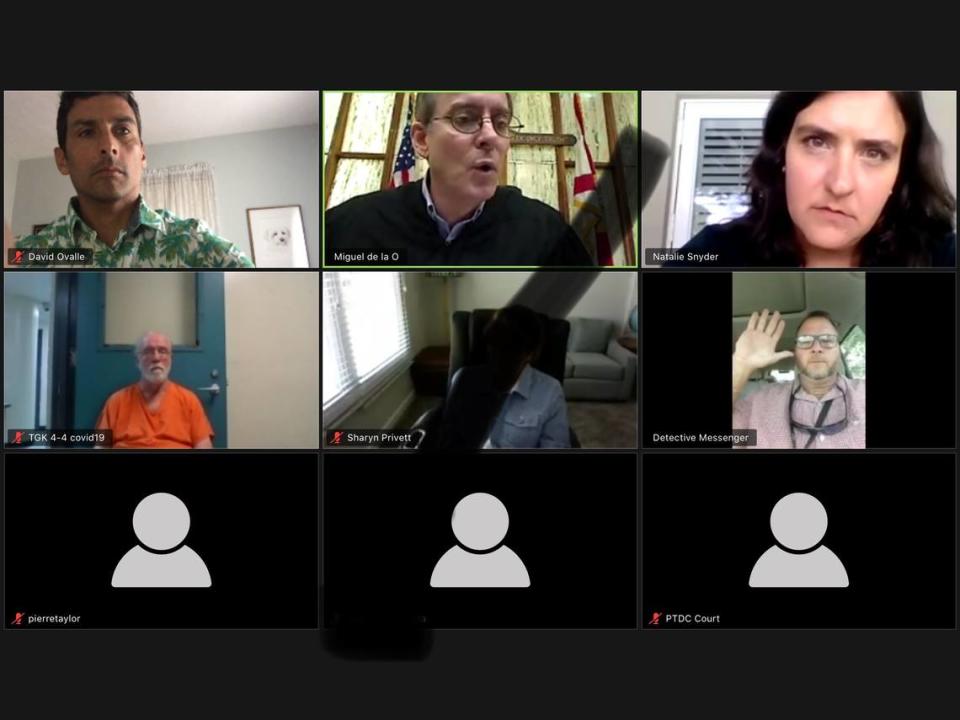Miami’s first Zoom crime court hearing: teacher accused of sex with student wants out of jail
The prosecutor checked in via computer from her home patio. The lead detective appeared, via smart phone, from the driver’s seat of his parked police SUV.
The defendant, a former school teacher accused of sex with an underage student, appeared on camera shackled inside a conference room at a jail. Ten miles away, at Miami-Dade’s justice building, inside courtroom 4-1, the defense lawyer stood at a podium, gloves on with a face mask dangling around her neck.
Miami-Dade Circuit Judge Miguel de la O, the other key player in the physical courtroom, called the hearing to order, peering into the lens of his desktop computer webcam.
The hearing on Thursday was the first major proceeding in Miami-Dade’s criminal justice system to be held via Zoom, the video conferencing app that has become a crucial lifeline to a national workforce largely confined in their homes to minimize the spread of the highly infectious virus. Judges for several weeks have also been using another remote conferencing system, LifeSize, to patch in lawyers, mostly through audio-only connections.
While jury trials themselves remain suspended, Miami-Dade officials hope that Thursday’s successful hearing will lay the groundwork for many more to come during the prolonged shutdown. The virtual video hearing — which lasted a little less than an hour and ended with the judge ruling that retired teacher Tom Privett must remain behind bars before trial — unfolded smoothly, despite the novel setup.
Privett’s wife appeared via video from her home in Pinellas County, as did the victim herself, her screen blank to protect her identity. So did a Miami Herald reporter and the court reporting firm that will one day transcribe the hearing.

As the coronavirus outbreak has largely shuttered courthouses, lawyers and judges across the nation have been forced to experiment with online platforms to keep the wheels of justice turning.
Four states, plus Puerto Rico, have mandated the use of virtual hearings, according to the National Center for State Courts, which has been tracking the effects of the pandemic. Nineteen states, including Florida, have issued orders to use them whenever possible. Another 13 have urged the use of virtual hearings, and suspended administrative rules that might have prohibited their use.
In Florida, the Supreme Court suspended jury trials on March 13, as counties across the state have grappled with how to limit crowds while still ensuring the administration of justice.
In Miami-Dade, the Richard E. Gerstein Justice Building was ordered closed last month for all but critical hearings to try to prevent the spread of the virus. But early on, many people, including defendants, were still showing up and courtrooms were crowded as the Public Defender’s Office filed scores of motions seeking to get people out of jail because of the pandemic.
Prosecutors, defense lawyers and judges have been working to try and free as many defendants accused of low-level crimes as possible to keep the jail population down. The jail population has dropped from about 4,000 before the pandemic hit full crisis to about 3,400.
Hearings are still continuing for newly arrested people, who are entitled to go before a judge within a day of their booking into jail.
Defendants appearing for “bond hearings” aren’t in the courthouse anyway — they appear via closed-circuit TV from the TGK jail. A handful of prosecutors, assistant public defenders, judges and court staff, working on rotations, are still showing up for those hearings.
So far, most other routine hearings have been a mix of in-person and telephone appearances.
On Thursday morning, Miami lawyer Richard Gregg sat in his home office in Kendall and dialed to LifeSize for the audio conference call. Several other lawyers were also on the line as they waited for the judge to finish up other hearings.
There were a lot of awkward noises: papers shuffling, random beeps, coughs and breathing. Miami-Dade Circuit Judge Miguel de la O, from the first-floor bond hearing courtroom, entered the conference call. The voices were sometimes garbled. He occasionally had to remind people to put their phones on mute if they weren’t speaking.
Eventually, he called the case of Florida vs. Rufus Collins, Gregg’s client. Collins was arrested for fleeing and eluding while awaiting trial on a drug case. Gregg was trying to get him out of jail.

The clerk’s office, however, did not yet have a copy of a motion, or even the arrest report. Luckily, the prosecutor did. Gregg insisted that Collins suffers from asthma and could be at risk of the coronavirus in jail.
Judge de la O agreed to let him out on house arrest.
“Not being in the courtroom, you don’t get a read of the judge or the prosecutor. I think I spoke over the judge a couple times,” Gregg said. “It makes it more difficult to do these types of motions, but they’re doing the best they can.”
Last week, Florida’s Office of the State Courts Administrator asked the different circuits to begin using Zoom, which has skyrocketed in popularity — it now has more than 200 million daily meeting participants users. The service has also promised to fix security flaws to curb “zoom bombing,” or hackers interrupting meetings with inappropriate images or sounds.
Miami-Dade judges are now undergoing Zoom training, and this week marked the first test hearings to move cases along — and avoid what could be a massive backlog of cases when the pandemic is over.
“As much as everyone is on hold, we want to get matters taken care of,” said Miami-Dade Circuit Judge Nushin Sayfie, who heads the criminal division. “We want to get cases disposed of properly ... we’re doing everything we can with the understanding that we’re asking for more patience.”
Thursday’s hearing involved Privett, 70, who was arrested in January and has been awaiting trial while in jail.
Prosecutors say Privett repeatedly had sex with a 17-year-old student in his classroom at the Terra Environmental Research Institute Magnet School. A 30-year history and government teacher, Privett taught most of his career at South Dade High and at Terra, a magnet school in West Kendall. He was also a longtime volunteer at Fairchild Tropical Botanic Garden, where he frequently worked with students.
Privett’s defense lawyer, Nina Tarafa, asked for what is known as an “Arthur hearing,” in which she would try to convince the judge to allow him out despite the seriousness of his alleged crimes.
Testifying from her home in Pinellas County, Privett’s wife insisted that he would not leave his house, and that a history of lung disease made him a prime candidate to catch COVID-19 while in jail.
“I’m afraid my husband will catch the disease and have a difficult time with it and he might die,” Sharyn Privett testified by Zoom.
But the state depicted Privett as a predator who could not be trusted back in society.
Miami-Dade Schools Detective John Messenger testified from his SUV, in a plaid shirt with sunglasses draped around his neck. He said he interviewed another victim who had been coerced into sex with the teacher — a woman who is now in her 30s and living in Colorado. However, she did not want to press charges.
“She did not wish to re-live it. She is a mother now and a wife now and that was a very traumatizing point in her life,” Messenger said.
Miami-Dade prosecutor Natalie Snyder said Privett faces life in prison and had already threatened the young woman who will testify against him in the charged case. “She is very scared of him,” Snyder said.
Judge de la O agreed, saying Privett would have “nothing to lose” by going on the lam.
“I think the wiser course is for me to exercise my discretion and deny Mr. Privett bond,” the judge said.

